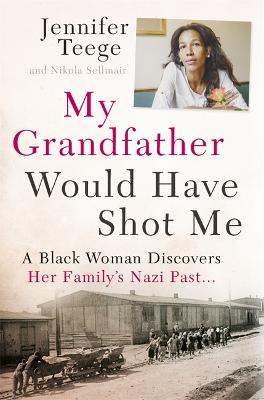Jennifer Teege was born to a German mother and a Nigerian father in 1970 in Germany. She was placed in a children's home. She was placed with a family at the age of three. Until the finalization of her adoption at age 7, she had frequent contact with her birth mother and maternal grandmother. She was very close to her grandmother.
She lived in Israel for five years as an adult and speaks fluent Hebrew. She was married and had two children. When she was 38 years old she was in a library and pulled a book off the shelf because the title sounded interesting. The author's name was the name of her birth mother. In the book she saw pictures of her beloved grandmother and read the truth about her background.
Her grandmother was the mistress of Amon Goethe, the commandant of a Nazi concentration camp in Poland. He was the main bad guy in the movie Schindler's List. In fact, Oskar Schindler had introduced her grandparents. Her grandmother had lived in the commandant's house just outside the camp.
This doesn't fit at all with Jennifer's memories of a kind and gentle woman. She buries herself in historical research.
In alternating chapters, the books tells Jennifer's story and discusses research about the affect of the Holocaust on German families. Most people don't know or try to whitewash their grandparents' roles.
This book is chilling. There is a picture of her grandmother posing with a dog. That dog was one of the two dog Goethe trained to kill prisoners.
She watches interviews with her mother and grandmother. Her grandmother was absolutely devoted to Amon Goethe until she died. She kept a picture of him over her bed.
"In 1948, two years after Amon Goeth’s execution, Ruth Irene Kalder asked the American authorities in US-occupied Germany to allow her to take on Goeth’s name, claiming that it was only the confusion at the end of the war that had prevented them from getting married."
Two years after he was executed as a war criminal, she asked to take his name? How messed up is that?
In another interview she said:
“‘It was a wonderful time’, his widow said. ‘We enjoyed each other’s company. My Amon was king, I was his queen. Who wouldn’t have relished that?’ She added that she was only sorry it was all over.” As to Amon Goeth’s victims, Ruth Irene Goeth adds: “They weren’t really people like us. They were so filthy.”
After finding out about her family history, Jennifer gets in contact with her birth mother. She realizes the mother didn't know about this until she was older either and the revelation has ruined her life.
I do recommend reading this book. I've never considered the affect of an ancestor's participation in World War II would have on German people. In the U.S. it is generally considered to be a good thing. In Germany it is mostly hidden.
I don't think that finding out that your ancestors did horrible things should change your perceptions of yourself but other people may have a harder time with that.
What do you think?
This review was originally posted on Based On A True Story
